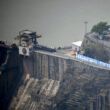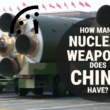China and nonproliferation: Divergence between policy and actions
By Rajesh Rajagopalan, November 21, 2016
Donald Trump's election as US president has thrown a monkey wrench into the complicated machinery of international politics. Trump's views on international relations and arms control appear unclear and ill-formed, but they definitely contain a strain of suspicion toward multilateralism. Trump has served notice of his intention to revisit the Iran nuclear deal and appears to be signaling a harder line on North Korea. In this new context it is necessary to be realistic, and an international focus on arms control seems preferable to wasting energy on pursuing a nuclear disarmament agenda that is unlikely to move forward.
Still suspect. My roundtable colleague Gregory Kulacki recommends that China consider unilateral nuclear disarmament. Before Trump's election, it seemed doubtful that China would follow such a path; now it seems even more so. Unilateral nuclear disarmament is a difficult item to sell to any nuclear-armed country, under any circumstances. Selling this idea to China will become even tougher if relations among great powers grow tenser, as is quite possible in a Trump presidency. In uncertain times, states are unlikely to embark on risky security policies. But China will nonetheless be important in carrying forward the modest nuclear agenda, focused on arms control, that makes sense to pursue during a Trump presidency.
Participants in this roundtable agree that China, because of its spectacular economic growth and its resulting importance in all aspects of international politics, is already an active and major player in global arms control. But Hua Han and I disagree on Beijing's view of multilateralism, and in particular whether China is ready to promote its self-interest while also, simultaneously, promoting the general interest. (No one expects China to sacrifice its self-interest any more than other states sacrifice their self-interest.)
Han is absolutely correct when she writes that "Preventing states from going nuclear clearly serves China's current national interests." She might even be correct that "Beijing has come to appreciate nuclear nonproliferation more than in years past." But China's nonproliferation policy may suffer from bigger problems than just the "implementation of … expanding commitments" that Han identifies. (All states face difficulties in implementing commitments in areas such as export controls and nuclear security. Occasional failures are to be expected. China is no exception.) The larger problem may be China's nonproliferation policy itself. In other words, the disconnect between China's stated policy and its actual actions are sufficiently divergent that one must ask whether the two are really the same. This disconnect explains why China's nonproliferation credentials are still suspect. Han acknowledges the questions sometimes raised regarding Beijing's nuclear cooperation with Pakistan and its reluctance to punish North Korea's proliferation. She also acknowledges "Chinese individuals' secret sales of prohibited items to Iran." It would have been useful if she had responded to these specific questions in her first essay.
On North Korea (to take up one of these issues myself), China has repeatedly sought to reduce the pressure that international sanctions exert on Pyongyang—pressure that might give North Korea's leaders some pause about pursuing their nuclear program. And though China has taken part in the negotiations over the North Korean nuclear issue, the talks have yielded little progress. North Korea has now conducted five nuclear tests, and several missile and rocket tests, in violation of UN Security Council resolutions. China, despite being North Korea's closest international partner and its economic lifeline, does not appear to have used its considerable clout with the Pyongyang regime to moderate North Korean behavior, let alone convince North Korea to roll back its nuclear weapons advances. In fact, entities within China apparently continue to facilitate North Korea's strategic programs. And regarding Pakistan, a recent report by Project Alpha at the Centre for Science and Security Studies, King's College, suggests that Chinese entities also continue to maintain links with Islamabad's strategic weapons program.
China's role in global arms control is important, especially considering Trump’s election, the challenge of North Korea’s nuclear weapons program, the deadlock in the Conference on Disarmament, and the possible unravelling of the Iran nuclear deal. That is why China needs to be more transparent and categorical about living up to its commitments to the nonproliferation system.
Topics: Nuclear Weapons
Share: [addthis tool="addthis_inline_share_toolbox"]














